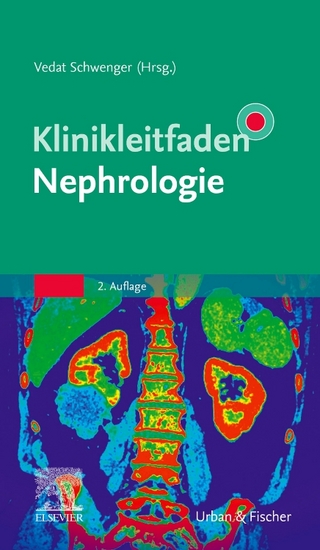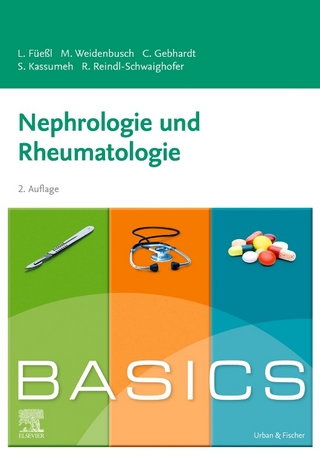
End-Stage Renal Disease
Academic Press Inc (Verlag)
978-0-12-672280-2 (ISBN)
- Titel ist leider vergriffen;
keine Neuauflage - Artikel merken
Contents
Contributors
Foreword
Preface
1 Renal Physiology and Pathophysiology of Renal Failure
I. Anatomy
II. Renal Blood Flow
III. Glomerular Filtration
IV. Renal Handling of Macromolecules
V. Renal Tubular Function
VI. Sodium
VII. Potassium
VIII. Calcium and Inorganic Phosphorus (Phosphate)
IX. Renal Regulation of Acid-Base Balance
X. Urinary Dilution and Concentration
XI. Renal Endocrine Function
General References
References
2 The Presentation of the Patient with Chronic Renal Failure
I. A Summary ofPatients~ Initial Modes of Presentation
II. The Uremic Illness
General References
References
3 Medical Complications of End-Stage Renal Disease
I. Introduction
II. Reversible Aspects of Renal Failure
III. Organ System Involvement and Other Complications
References
4 Endocrine and Metabolic Changes Accompanying End-Stage Renal Disease
I. Introduction
II. Abnormalities of Basal Metabolism and Thyroid Hormone Economy
III. Glucose and Insulin Metabolism in Uremia
IV. The Hyperlipidemias
V. Growth Hormone and Somatomedin Metabolism in Uremia
VI. Pituitary Adrenocortical Function in Uremia
VII. Pituitary-Gonadal Axis
VIII. Gastrointestinal Hormones
IX. Synthesis
General Reference
References
5 Psychiatric Aspects of End-Stage Renal Disease: Diagnosis and Management
I. Personality Changes in End-Stage Renal Disease
II. Education for Patients with Pre-End-Stage and End-Stage Renal Disease
III. Psychological Factors Influencing the Choice of Alternative Methods of Treatment
IV. Neuropsychiatric Manifestations with End-Stage Renal Disease
V. Reactions of Staff in a Dialysis Center
VI. The Role of Psychiatrist as a Team Member of a Nephrology Unit
VII. Summary
General References
References
6 Social Work with Renal Failure Patients: Roles of the Social Worker
I. Introduction
II. Roles of the Social Worker
III. Concluding Statement
General References
References
7 The Problem of Vascular Access in the Management of End-Stage Renal Disease: The Various Possibilities of Producing a Shunt
I. Access for Hemodialysis
II. Access for Peritoneal Dialysis
III. Conclusion
General References
References
8 Dialysis
I. Introduction
II. Hemodialysis
III. Peritoneal Dialysis
IV. Results of Dialysis
References
9 Technical Aspects of Dialysis
I. Introduction
II. Water Treatment
III. Hemodialysis Systems
IV. Dialyzer Reuse
V. Peritoneal Dialysis
VI. Patient Education
References
10 The Case for Renal Transplantation
I. The Concept of Transplantation
II. Recipient Selection
III. The Evaluation of Prospective Kidney Donors
IV. The Surgical Procedure
V. Immunosuppression
VI. Long-Term Management
VII. Long-Term Complications Following Transplantation
VIII. Data Analysis
General References
References
11 Nursing Care of the Patient with End-Stage Renal Disease
I. Introduction
II. The Renal Clinic
III. Hemodialysis
IV. Peritoneal Dialysis
V. In-Center Dialysis
VI. Renal Transplantation
VII. Conclusion
References
12 The Role of Nutrition in End-Stage Renal Disease
I. Introduction and General Principles
II. Predialysis and Dialysis: Individual Components of the Diet
III. Transplantation
IV. Special Considerations
V. Compliance
VI. Conclusion
References
13 End-Stage Renal Disease: An Integrated Approach
Subject Index
| Erscheint lt. Verlag | 10.5.1983 |
|---|---|
| Verlagsort | San Diego |
| Sprache | englisch |
| Gewicht | 960 g |
| Themenwelt | Sachbuch/Ratgeber ► Gesundheit / Leben / Psychologie ► Krankheiten / Heilverfahren |
| Medizinische Fachgebiete ► Innere Medizin ► Nephrologie | |
| ISBN-10 | 0-12-672280-3 / 0126722803 |
| ISBN-13 | 978-0-12-672280-2 / 9780126722802 |
| Zustand | Neuware |
| Haben Sie eine Frage zum Produkt? |
aus dem Bereich


